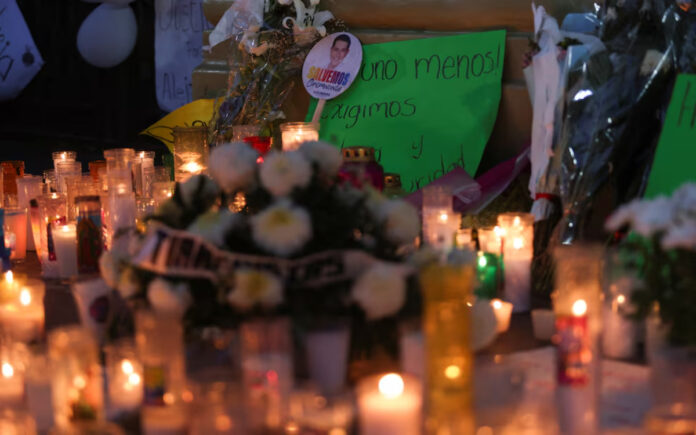Chilpancingo, Mexico: Hundreds of people, dressed in white and filled with grief, marched through the streets of Chilpancingo, chanting “No More Violence!” just days after the shocking murder of its mayor. The brutal decapitation of 43-year-old Alejandro Arcos has left the town in mourning and raised questions about the effectiveness of President Claudia Sheinbaum’s security strategy. Arcos’ murder, still unsolved, has deepened the sense of anger and frustration, as many Mexicans wonder whether their new president can bring justice and curb the cartel-driven violence that has gripped the country for over a decade.
“We really don’t want ‘hugs, not bullets,'” said Doreli Vega, 30, echoing her frustration with Sheinbaum’s mentor, Andrés Manuel López Obrador’s, pacifist approach toward cartels. “We’re tired of that,” the young mother wept as she spoke about the fear that dominates her daily life.
Vega, who has a one-year-old child, said that despite the increased presence of the militarized National Guard, which López Obrador empowered as the central law enforcement force, security in Chilpancingo, the capital of Guerrero state, has worsened. Guerrero, one of the poorest states in Mexico, has long been a hotspot for cartel violence.
“They feel they have the power to do whatever they want, and we really haven’t seen the change that they promised for the security of our people,” Vega added. “Everything got worse.”
The growing unrest was further fueled by another local mayor’s murder. Roman Ruiz Bohorquez, mayor of Candelaria Loxicha in Oaxaca, was stabbed to death at his home just days after Arcos’ killing.
Arcos and Ruiz Bohorquez are among 1,247 homicide victims reported in the first two weeks of Sheinbaum’s presidency, according to analysis by TResearch, a Mexican polling firm. The escalating violence marks a critical challenge for Sheinbaum’s administration, as Mexico’s staggering murder rate shows no sign of abating.
Arcos’ high-profile killing, which has shaken even the violence-hardened residents of Chilpancingo, is seen as a major test for Sheinbaum’s ability to tackle cartel control. Her security strategy combines López Obrador’s emphasis on social programs with enhanced intelligence sharing, government coordination, and a stronger National Guard.
“It’s a shot across the bow of organized crime writ large that they’re not scared,” said Mike Ballard, director of intelligence at international security firm Global Guardian. Ballard described Arcos’ killing as “almost an act of terror.”
Arcos had reportedly left Chilpancingo in his pickup truck without security personnel, heading towards Petaquillas. Some reports suggest he had met members of Los Ardillos, a powerful criminal group in Guerrero, though this remains unverified by Reuters.
Elsewhere in Mexico, violence is also spiraling. In Culiacán, the capital of Sinaloa, a power struggle within the infamous Sinaloa Cartel has resulted in over 230 deaths. The conflict was triggered by the arrest of Ismael “El Mayo” Zambada, a legendary figure in the Sinaloa Cartel.
On the day of Sheinbaum’s inauguration, Mexican soldiers shot and killed six migrants and injured ten others in Chiapas, near the Guatemalan border, mistaking their vehicle for one used by organized crime. The defense ministry has since detained the soldiers responsible for the tragic mistake.
“She doesn’t have many good options to try and combat this, but I think the murder of Arcos is definitely a wake-up call that something has got to change,” said Ballard.
Fading Hopes
Sheinbaum faces an uphill battle, balancing subtle changes to the previous administration’s security strategy while remaining committed to its broader vision. She plans to retain the National Guard while addressing the social causes of violence, focusing on improving Mexico’s dismal crime resolution rate—currently around 1%, according to Human Rights Watch.
Critics argue that López Obrador’s passive approach allowed cartels to expand and strengthen. Nearly 200,000 people were killed during his six-year term—an average of one every 15 minutes—marking the highest murder rate in modern Mexican history.
Guerrero is one of the states where Sheinbaum has promised to focus her efforts. However, on the streets of Chilpancingo, where residents are too fearful to venture out after dark, hope for improvement is dwindling. The constant threat of violence has severely impacted the local economy.
Also Read | Mexico’s Navy Seizes Record 8.4 Tons of Drugs, Arrests 23
“The idea of an entrepreneur is to grow or reinvest, but right now we don’t have the confidence to do so. There’s simply no development at the local business level,” said Ivan Salgado Ramirez, president of Chilpancingo’s business chamber.
Salgado expressed cautious optimism about Sheinbaum’s promise to prioritize Guerrero, but added, “Only time will tell if it brings the peace we need.”
While the state has historically been a stronghold for López Obrador and his Morena party, buoyed by social welfare spending, many residents are losing faith.
Also Read | José Zamora Granted House Arrest After 800 Days as a Political Prisoner
“What future awaits my grandchildren and great-grandchildren?” asked 68-year-old Maria Victoria Ramirez, marching at the front of the protest alongside her family. “She (Sheinbaum) hasn’t come here to Chilpancingo. She doesn’t realize how dangerous it is.”
As the march reached Chilpancingo’s main plaza, a crowd of around 1,000 people had gathered to honor Arcos. The bells of the town’s cathedral rang out as a memorial service for the fallen mayor began. An elderly couple, holding hands, reflected on whether they believed Sheinbaum could make their city safer.
“Unfortunately not. We can only trust in God,” the woman said.



